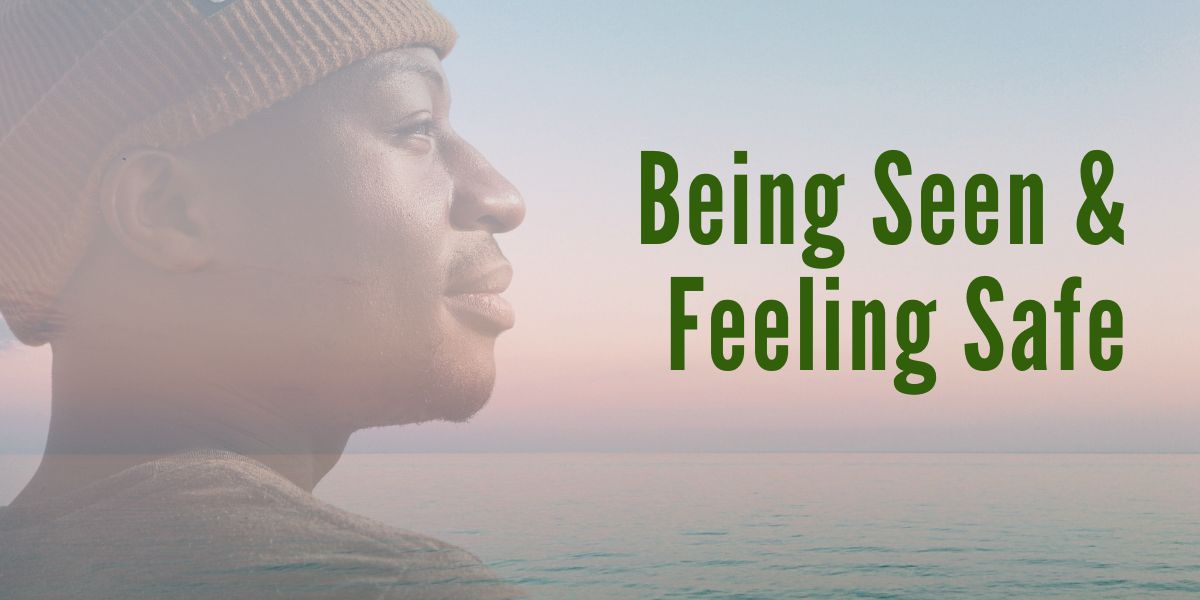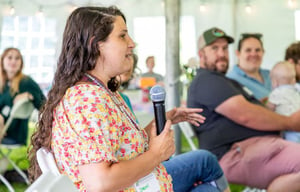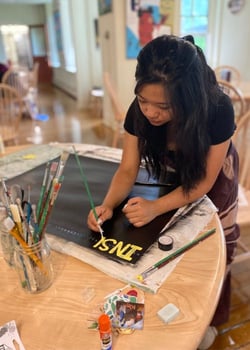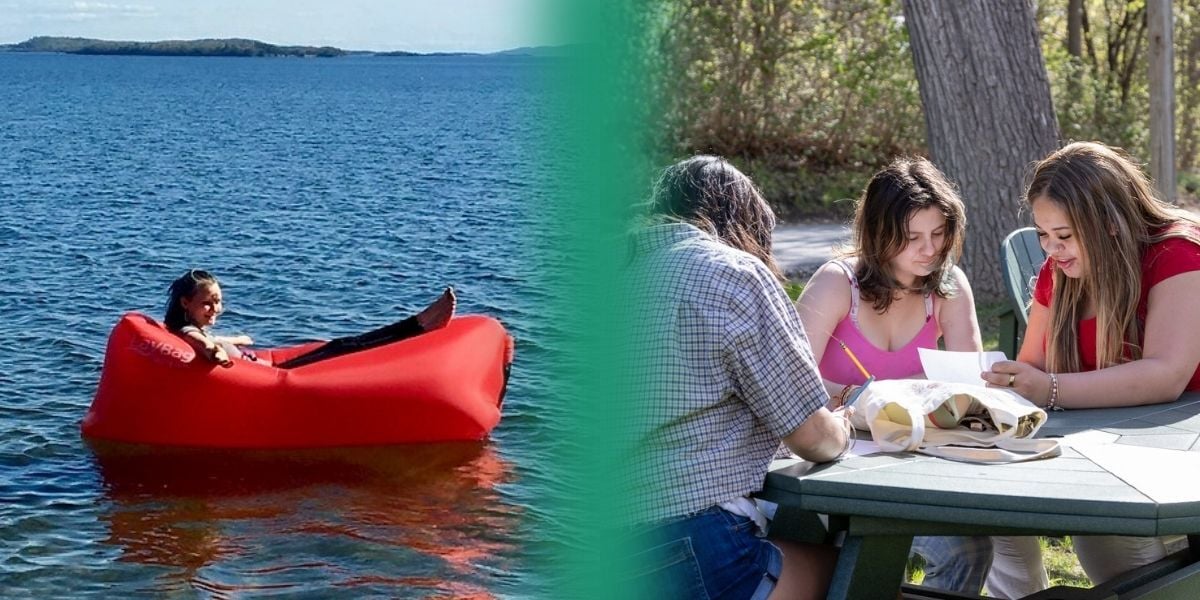Easing the Transition: Supporting Students as They Head Back to School
As the days grow shorter and the first signs of fall begin to appear, the shift from summer to school year is palpable for students, families, and...

“When I came to Rock Point, I had a lot of social anxiety that I was pretty good at masking. I was really self-conscious, but I tried to act more confident. When we had our break during morning classes and other students would head to the kitchen for a snack or hang out in the lounge, I would head to the history classroom and read until our class started. Gus, our history teacher, was usually working there and didn’t say much, which was a relief to me. One day, I sat down and took out my book, and without looking up from his work, Gus said, ‘I see you.’ And I knew he did. It made me feel good to know that I didn’t have to talk about it but that he saw me and knew what I needed. I felt that way many times at Rock Point, and I carried that feeling into my work with young people and my parenting. Truly seeing other people is such a gift, and the fact that the adults at Rock Point made an effort to see me for who I was while I was there helped me to grow and feel safe.” - Sarah Carpenter, ‘08
When Sarah shared this story at our reunion this June, I was struck by how clearly she remembered such a small moment in her time at Rock Point School and how much it affected her. In further talking with her, I realized that the moment stuck with her because, as soon as Gus said that to her, she began to notice how other staff members “saw” her. It became a natural touch point for a feeling of safety and security in her time at the school. As we talked, I began to think about how “seeing” students is central to what we do as a school.
 In the most basic sense, being seen is the opposite of being ignored. Many of our students come from larger schools where they may have been able to fade into the background, where people made assumptions about them based on their clothing choices or their diagnostic labels, or peer groups may have ostracized them. Dr. Kipling Williams at Purdue University has researched what happens when people are rejected or ignored, and, unsurprisingly, what he has found is that it can create psychological damage and increase the kind of behavior that cannot be ignored.
In the most basic sense, being seen is the opposite of being ignored. Many of our students come from larger schools where they may have been able to fade into the background, where people made assumptions about them based on their clothing choices or their diagnostic labels, or peer groups may have ostracized them. Dr. Kipling Williams at Purdue University has researched what happens when people are rejected or ignored, and, unsurprisingly, what he has found is that it can create psychological damage and increase the kind of behavior that cannot be ignored.
At this level, it is clear why we all need to be seen. To be seen means you are known and acknowledged for who you are - both the good and the bad, the parts you are showing to the world, and the parts you may be trying to hide. Williams’s research shows that social attentiveness to those around you can create positive, prosocial behaviors. But a desire to “see” our students goes far beyond that. We want to know our students because we believe all people deserve to be treated with dignity and respect, and, to do that, you must create an environment where people are known and their voices can be heard.
Our school year begins with a period of diagnostic teaching, which means much of the first quarter teachers spend getting to know students in person. Of course, before students arrive, we read their grade reports, IEPs, and other testing, but often the student sitting in front of us isn’t fully reflected in those files, however detailed they may be. Students who may have a diagnosed reading disability may be passionate readers (if it’s a book in their favorite series), and students who have historically avoided math class may love making fractal patterns in Geometry. Our teachers work throughout the year to make these discoveries and tap into what each student needs to be successful.
This way of knowing students goes far beyond the classroom. It can be seen at lunch table conversations where students share hot takes on recent movies or on the weekend when a student works with a Residential Educator to plan an activity they love and want to share with the community. It’s visible in Community Meetings where students share their ideas about how to improve a school policy or in Reflections Meetings when students make and share their vision boards for the school year. At each of these touchpoints, students and staff are making efforts to fully see one another and connect. As a result of these connections, students feel safe and can grow. As Lily, ’23, said at graduation:
“People around me at Rock Point recognize the actions that I take and the things that I do. There is no running away from your issues here. Now, as I move through the world, I attempt to live in a way that I’m proud of. I attempt to have the actions I take be a positive reflection on myself. I want people to fully see me instead of hiding and not wanting people to see anything negative about me. I am grateful to Rock Point for helping me to start on a path of seeing who I want to be and seeing what’s important to me.” - Lily, ‘23
 Being seen, heard, and accepted for who you are
Being seen, heard, and accepted for who you areIt is crucial for young people, really all people, to be seen, heard, and accepted for who they are. We have witnessed firsthand the transformations possible for our students when we can nurture those hidden parts of themselves. The changes our students experience are not because they have become different people (although some of them might feel that way) but because they are allowing themselves to be seen, and therefore, they can embrace their strengths and challenges, becoming the best versions of themselves.
Seeing Beyond the Labels, C. J. Spirito
Ostracism, Kipling D Williams. PubMed®
"Ignored? Better a 'no' than no answer at all." University of Basel. ScienceDaily.
Williams, K.D. Ostracism: Effects of being excluded and ignored. (2009) Advances in Experimental Social Psychology, 41, 279–314.

As the days grow shorter and the first signs of fall begin to appear, the shift from summer to school year is palpable for students, families, and...

One of the unexpected changes over the past few years has been how the rise of video meetings allows greater participation. We’ll always value...

As school winds down and the weather heats up, our students are already looking forward to summer. Some are planning to get jobs or go to camp,...